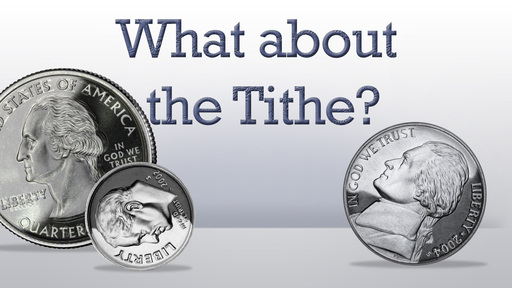What about "the Tithe"?

I. Introduction
There are some concepts and doctrines contained in the Bible that are so polarizing and offensive to many of us that we often check out as soon as any mention is made of them. We can often get into serious disagreement when we bring up these subjects and become divided in our thinking and consequently our love for one another can become fractured.
One such doctrine is that of tithing. Since it involves the acquisition and expending of money which we expend so much time, talent, and energy to acquire, money often times becomes the basis for how we view and assign status to ourselves as well as to others too. So, today we want to look at the doctrine and practice of tithing, and to ascertain its applicability in the New Testament church.
II. The Law on the “Tithe”
A. The Levitical Tithe (Lev 27:30-34)
B. The Festival Tithe (Deut. 14:22-27)
C. The Poor Tithe (Deut 14:28-29)
D. What about tithe passages outside the Pentateuch in the Old Testament?
III. Aren’t their New Testament instructions about the tithe?
A. Jesus’ instructions in Matt. 23:23 (cf. Luke 11:42) and his parable in Luke 18:9–14.
B. The previous verses along with Hebrews 7:5 are the only verse in the whole New Testament that speak of taking a tithe or giving a tithe with this Greek word–ἀποδεκατόω!
C. Another Greek word, δεκατόω, used in Hebrews 7:6, 9 only appears in that verse!
D. The noun form of our translation for tithe in the New Testament appears only 7 times, once in John 1:39 (speaking of the hour), 4 times in Hebrews 7:2, 4, 8, 9 (referring to the Old Testament patriarchs Abraham and Levi), and twice in Rev. 11:13 (referring to part of city falling) and Rev. 21:20 (referring to the number of a foundation).
the problem with traditionalism is that, in keeping with a principle that evangelicals have held dear at least since the Reformation, unless a requirement can be established from Scripture, it should not be imposed upon believers
The four main passages in which Paul discusses giving are 1 Cor 9:1–23, 16:1–4; 2 Cor 8–9; and Phil 4:15–17.
IV. A Cliffhanger Conclusion
“The loose way in which many members wear their plain obligations to the church … is a scandal which enormously weakens its influence. Desultory church attendance, neglect of public worship, failure to identify oneself with the church’s work and mission in the world, niggardly gifts, lack of all personal interest and loyalty: these are ways in which the laity of today rob God of the honor to which He is entitled” (140).
